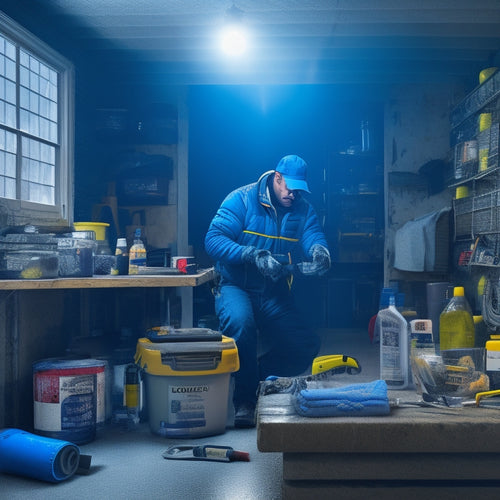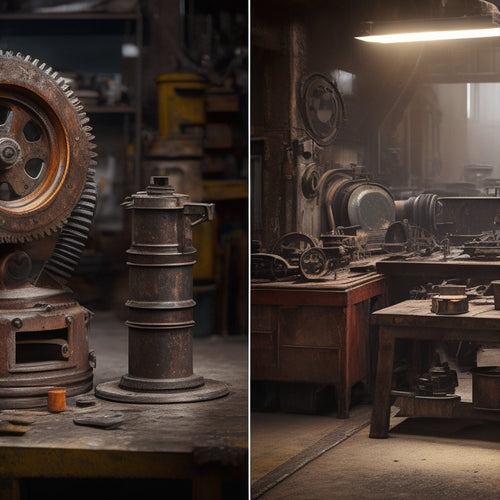Troubleshoot and Fix Common Panel Issues Easily
Share
When your solar panel system underperforms or fails, swift troubleshooting is critical to minimize energy losses, safety hazards, and costly downtime. To troubleshoot and fix common panel issues easily, identify the root cause quickly, check and clean panels, and conduct shade analysis. Implement predictive maintenance and utilize real-time monitoring to detect inverter issues. Alert potential safety hazards and address ground faults promptly. Inspect electrical connections, and monitor temperature fluctuations to prevent system overheating. By following these steps, you'll be well on your way to resolving common panel issues and optimizing your system's performance - and there's more to explore to make sure your system runs smoothly.
Key Takeaways
• Identify and address shading issues promptly to prevent energy losses and safety hazards.
• Conduct regular panel cleaning and inspection to ensure maximum energy absorption.
• Utilize real-time monitoring and predictive maintenance to detect inverter issues quickly.
• Check and verify electrical connections to prevent system downtime and equipment damage.
• Investigate voltage fluctuations and temperature fluctuations to prevent energy losses and system shutdowns.
Panel Not Producing Power
Identifying the root cause quickly is vital when your solar panel system fails to generate power, in order to minimize energy losses and potential safety hazards.
You need to act fast to identify and fix the issue. Start by checking the obvious: make sure that your panels are clean and free of debris. Dirty panels can greatly reduce energy output, so perform a thorough panel cleaning to remove dirt, dust, and other obstructions.
Next, conduct a shade analysis to detect any obstructions that might be blocking sunlight from reaching your panels. Even partial shading can substantially decrease energy production, so it's important to identify and address any shade issues.
Inverter Failure Detection
Your inverter's sudden failure can bring your entire solar panel system to a grinding halt, so it's essential you detect the issue quickly.
Inverter failure can be a frustrating and costly experience, but with the right tools and strategies, you can identify and address the problem promptly. One effective approach is to implement predictive maintenance, which involves monitoring your inverter's performance in real-time to anticipate potential issues before they occur.
By leveraging real-time monitoring, you can detect subtle changes in your inverter's behavior, allowing you to take corrective action before a complete failure. This proactive approach enables you to minimize downtime, reduce repair costs, and maintain your solar panel system operates at peak efficiency.
Ground Fault Alerts
Ground fault alerts are important notifications that alert you to potential safety hazards in your solar panel system, allowing you to take swift action to prevent electrical shock or even fires. These alerts are triggered when a fault is detected in your system's grounding, which can occur due to a variety of reasons such as faulty wiring, corrosion, or even animal infestations. It's crucial to address these alerts promptly to ensure the safety of your system and prevent potential disasters.
Fault detection methods, such as ground fault detection devices, play a significant role in identifying these issues. These devices continuously monitor your system's electrical currents and alert you when a ground fault is detected.
It's important to make sure that your system meets the required electrical safety standards, such as those outlined by the National Electric Code (NEC) or the International Electrotechnical Commission (IEC).
Low Voltage Warnings
When your solar panel system's voltage drops below a predetermined threshold, low voltage warnings are triggered, alerting you to potential issues that can impact energy production and overall system performance.
As a system owner, it's important to address these warnings promptly to prevent energy losses and system downtime. Voltage fluctuations can cause low voltage warnings, and it's vital to identify the root cause of these fluctuations. Electrical surges, faulty inverters, or loose connections can all contribute to voltage drops.
You should inspect your system's electrical connections, making sure they're secure and free from corrosion. Also, check your inverter's performance, as faulty or malfunctioning inverters can trigger low voltage warnings. If you're still unsure about the cause, consult your system's monitoring data to identify patterns or anomalies that might indicate the source of the issue.
Overheating System Errors
When you're troubleshooting overheating system errors, you'll need to investigate potential causes that can lead to system shutdowns or even equipment damage.
You'll want to check if clogged air vents are blocking airflow, if high ambient temperatures are contributing to the issue, or if the cooling system is insufficient for the panel's power requirements.
Clogged Air Vents Cause
Clogged air vents are likely culprits behind overheating system errors, as they obstruct the free flow of air, causing heat to build up inside the panel. When you neglect to clean or maintain your panel's ventilation system, dust accumulation can become a significant issue. This can lead to overheating, which can cause system errors, slow performance, and even damage to your equipment.
Some common signs of clogged air vents include:
-
Increased temperatures: If your panel is consistently running hotter than usual, it may be due to clogged air vents.
-
Reduced airflow: If the air vents are clogged, you may notice a significant reduction in airflow, which can exacerbate overheating issues.
-
Dust buildup: Visible dust accumulation around the air vents or within the panel is a clear indication of poor ventilation design or maintenance.
- System crashes: If your panel is overheating due to clogged air vents, it may lead to system crashes or shutdowns, causing downtime and lost productivity.
High Ambient Temps Contribute
High ambient temperatures in your operating environment can greatly contribute to overheating system errors, as your panel's cooling system struggles to dissipate heat effectively.
During a heat wave, your panel's temperature can skyrocket, causing system crashes and errors. Monitoring temperature fluctuations in your operating environment is crucial to prevent overheating issues.
When the ambient temperature rises, your panel's cooling system has to work overtime to dissipate the heat. If the cooling system is inadequate or malfunctioning, it can lead to overheating system errors.
You may notice your panel's performance slowing down, or it may shut down entirely to prevent damage. To avoid overheating issues, make sure your operating environment is well-ventilated, and your panel is installed in a location that allows for good airflow.
Regularly cleaning your panel's air vents and fans can also help prevent overheating system errors. By taking these precautions, you can minimize the risk of overheating and ensure your panel operates efficiently.
Insufficient Cooling System
Your panel's cooling system is often the weakest link in the chain, and a faulty or undersized cooling system can lead to overheating system errors, especially in hot operating environments. Insufficient cooling can cause components to malfunction, slow down, or even fail, resulting in costly downtime and repairs.
To avoid these issues, it's essential to design and implement a robust cooling system that can handle the heat generated by your panel's components. By optimizing airflow and using efficient cooling system designs, you can prevent overheating and ensure your panel operates reliably and efficiently.
-
Inadequate airflow: If your panel's cooling system can't provide sufficient airflow, components will overheat, leading to errors and shutdowns.
-
Poor cooling system designs: A poorly designed cooling system can't dissipate heat efficiently, causing components to overheat and fail.
-
Inadequate heat sink design: A heat sink that's too small or poorly designed can't dissipate heat efficiently, leading to overheating and component failure.
- Inadequate airflow optimization: If your panel's airflow isn't optimized, components won't receive the cooling they need, leading to overheating and errors.
Loose or Faulty Connections
Faulty connections can cripple your panel's performance, and a simple tug on the wires often reveals loose connections as the culprit. When you're experiencing issues, conducting connection troubleshooting is crucial to identify the root cause.
Start by visually inspecting the wiring for signs of wear, corrosion, or damage. Look for loose connections, frayed wires, or bent pins. Use your wiring insights to pinpoint potential hotspots where connections might be compromised.
Next, use a multimeter to test the connections and verify the integrity of the wiring. Check for voltage drops, resistance, and continuity to make sure the connections are secure and functioning as intended.
Remember, a single faulty connection can bring your entire system to a grinding halt. By taking the time to inspect and test your connections, you'll be able to identify and rectify issues quickly, getting your panel back online in no time.
Don't let loose or faulty connections hold you back – take control and troubleshoot your way to peak performance.
Inconsistent Energy Output
When your panel's energy output fluctuates wildly, it's a clear indication that something is amiss, and pinpointing the root cause is crucial to restoring consistent performance.
You can't afford to overlook energy fluctuations, as they can lead to reduced system efficiency, overheating, and even component damage. To get to the bottom of output variance, you'll need to investigate several potential culprits.
Here are some common causes of inconsistent energy output:
-
Shading or debris obstruction: Make sure your panel is free from obstructions, such as leaves or bird droppings, which can block sunlight and reduce energy output.
-
Dirty or defective panels: Clean your panels regularly to guarantee maximum energy absorption, and replace any defective panels to prevent energy loss.
-
Inverter issues: Check your inverter's performance and calibration to ensure it's functioning correctly and not causing energy fluctuations.
- Grid connection problems: Verify that your panel is properly connected to the grid and that there are no issues with the grid itself.
Frequently Asked Questions
Can I Repair a Damaged Panel Myself or Do I Need a Professional?
"You're weighing DIY repairs against hiring a pro. Be aware that DIY risks include safety hazards and further damage, while professional benefits include expertise, warranty preservation, and efficient solutions, so choose wisely."
How Often Should I Clean My Solar Panel to Maintain Efficiency?
You'd be shocked to know that a single layer of dust can reduce your solar panel's efficiency by up to 20%! Clean your panels every 2-3 months to prevent dust accumulation, as rainwater effectiveness is limited in washing away stubborn grime.
Will a Faulty Inverter Affect the Entire Solar Panel System?
If your inverter fails, you'll likely experience system downtime, and it's important you address the issue promptly to minimize energy losses; a faulty inverter can greatly impact your entire solar panel system's performance.
Can I Upgrade My Existing Solar Panel System to a Newer Model?
'When upgrading your existing solar panel system, you'll need to verify system compatibility and model comparability, carefully evaluating the new model's specifications to guarantee a seamless integration, avoiding potential power losses and maximizing energy efficiency.'
Do Solar Panels Still Generate Power During a Blackout?
During a blackout, you won't generate power from solar panels connected to the grid, as they're designed to shut off for safety reasons. However, with energy storage and grid resilience, you can achieve energy autonomy and maintain power supply.
Related Posts
-

Waterproofing Solar Panels for Vehicles: A Step-by-Step Guide
When waterproofing solar panels for your vehicle, start by evaluating your energy requirements and selecting the righ...
-

Why Higher Upfront Costs Are Worth It
You pay a premium for high-quality, energy-efficient products, but they're worth it. With durability testing ensuring...
-

What Role Do Unicycles Play in Urban Transport?
As you navigate through congested city streets, unicycles emerge as a viable solution, slashing carbon emissions by u...


